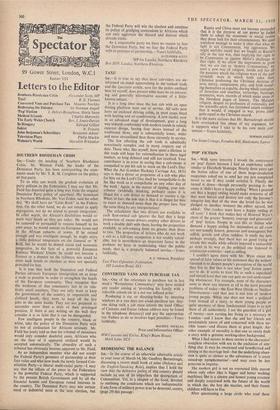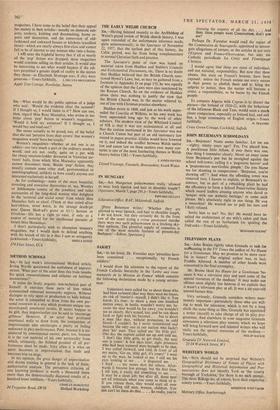SIR,—With , some temerity I invade the controversy on 'pop' fiction
because I had an experience rather similar to Elizabeth Montagu. Nearly three years ago the fiction editor of one of these large-circulation magazines asked me to send her my just completed novel to see if they could serialise it. Finally she turned it down—though personally praising it—be- cause it 'didn't have a happy ending.' When I pointed out that a happy ending would make nonsense of all that went before and destroy not only the heroine's integrity but that of the man she loved (as he was pledged to another woman) the editor agreed, but added : 'Our readers must have a happy ending at all costs.' I think that makes hay of Howard Wyce's claim of the greater 'honesty, courage and generosity' of 'pop' fiction. People in real life or fiction who demand a happy ending for themselves at all costs are not usually honest, generous and courageous,- but selfish, greedy and often ruthless. It made me feel, perhaps wrongly, that there was no good trying to invade this media while editors imposed a censorship as strict in its way as the political one imposed in totalitarian countries-Land as stifling.
I couldn't agree more with Mr. Wyce about the spread of false values or his statement that the writers' function is to deepen people's perception of the world they live in. But that is just what 'pop' fiction seems not to do. It seems to treat life at such a superficial and unreal level that one can gain no real understand- ing whatsoever. For example, none of the characters seem to shOw any interest at all in the most pressing problems of today—the East-West Divide or Nuelear Disarmament—and that just is not true of modern young people. While one does not want a political tract instead of a story, to show young people as quite unaware of these fundamental issues is to rob them of all authenticity. I am the guardian of a girl of twenty—now earning her living as a secretary in London—and I know that she and her friends are passionately aware of and concerned with these ter- rible issues—and discuss them at great length. An- other example of unreality is that one so rarely finds a story with a genuine working-class background. What I find sinister in these stories is the characters' complete obsession with sex to the exclusion of any- thing else. It may be sweetened and bowdlerised and aiming at the marriage bed—but the underlying obses- sion is quite as sinister as the adventures of 'a crazy mixed-up nymphomaniac'—and may even be less generous in impulse.
The modern girl is not an oversexed little moron whose only other idea is bigger and better washing Machines. She is a sincere and honest young creature and deeply concerned with the future of the world in which she, the boy she marries, and their future children will have to live.
After questioning a large circle who read these magazines, I have come to the belief that their appeal lies mainly in their articles—usually on domestic sub- jects, cookery, knitting and dressmaking, home re- pairs and decoration, and the conversion of old- fashioned and awkward houses or kitchens (excellent these)—which are nearly always first-class and cannot fail to be of interest to any woman who runs a home.
I will utter the frightful heresy that if all or nearly all the 'pop' fiction was dropped, these magazines would continue selling on their articles. It would also be interesting to see what would happen if the edi- tors permitted a greater depth of reality in the stories they chose—as Elizabeth Montagu says, if they were



































 Previous page
Previous page